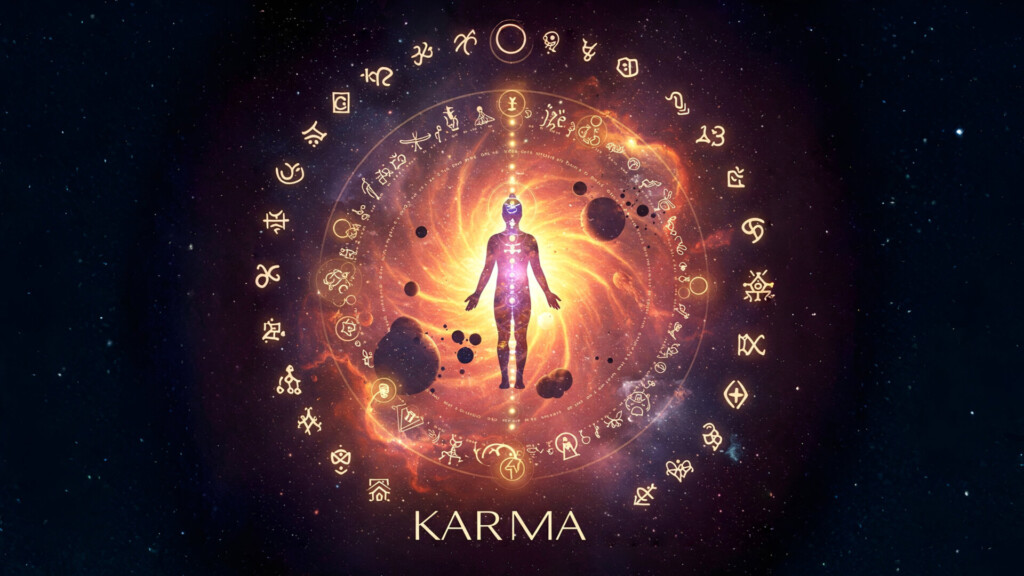1. Karma in Buddhism – Consequence or Punishment?
When people hear about karma, they often think of “instant karma”—a cosmic justice system that punishes wrongdoers on the spot. However, In Buddhism, karma is not a supernatural judge but a natural law of cause and effect: you reap what you sow. Karma and life consequences are deeply intertwined—your actions set off a chain of events that shape not just your future, but potentially future lifetimes as well.

This idea resembles the Just-World Hypothesis in psychology—the belief that life is inherently fair. But reality tells a different story: good people suffer while wrongdoers prosper. Buddhism explains this by stating that karma’s effects may be immediate, delayed, or even carried into future lives.
However, this belief could also stem from Cognitive Dissonance—our brain dislikes injustice. When we see an evildoer go unpunished, we rationalize it: “their karma hasn’t caught up yet” or “they’ll pay in the next life.” This suggests karma may be more of a psychological coping mechanism than an objective law.
Unlike a rigid punishment system, karma allows for transformation. The story of Angulimala—a murderer who repented and attained enlightenment—demonstrates that past actions don’t permanently define one’s fate.
2. Why Do Some People “Escape” Karma?
If karma is a universal law, why do some corrupt individuals live in luxury? Buddhism answers this through Alaya-vijnana—a sort of “karma bank” where effects accumulate and manifest over time.
This idea parallels Newton’s Third Law—every action has a reaction, but in society, power and circumstances shape how consequences unfold. A fraudster may remain rich, not because karma doesn’t exist, but because the system sustaining them hasn’t collapsed.
Additionally, our belief in karma may be shaped by Confirmation Bias—we notice when “karma strikes” but dismiss times when wrongdoers go unpunished. As psychologist Melvin J. Lerner (1980) found, people cling to the belief in justice even when no clear evidence supports it.
3. The Christian Perspective – Karma vs. Forgiveness
Christianity does not teach karma, but it upholds the idea of consequences:
“Do not be deceived: God is not mocked. Whatever a man sows, he will also reap.” (Galatians 6:7)
However, Christianity differs in its emphasis on forgiveness. The Parable of the Prodigal Son illustrates this: despite his mistakes, the son is welcomed back by his father, symbolizing God’s mercy.
This aligns with Self-Narrative Theory—the belief that redemption fosters personal change. While karma operates like a mathematical equation, Christianity focuses on inner transformation.
Different Christian traditions approach forgiveness uniquely:
- Catholicism: Repentance through the Sacrament of Confession.
- Protestantism: Salvation comes through faith in Christ rather than personal deeds.
The key difference? Karma is inescapable, but Christianity allows divine forgiveness.
4. Does Forgiveness Mean No Consequences?
Can wrongdoers simply pray and be absolved? Christianity does not promote “spiritual loopholes.” A person may receive divine forgiveness but still faces human accountability.
Psychologist Baumeister (1994) found that true change occurs only when individuals face consequences, not just through forgiveness. Criminal psychology also suggests that people who evade direct consequences are more likely to reoffend.
Thus, Christianity does not erase responsibility but offers a chance for change. However, if one only prays without changing, they still bear legal and social repercussions.
5. So, Is Karma Real?
Humans naturally seek patterns in chaos, making karma an appealing belief. When a wrongdoer suffers, we call it “instant karma,” but when they thrive, we assume “karma hasn’t arrived yet.” This is Pattern Recognition Bias—our tendency to perceive order where none exists.
If karma were absolute, why do war criminals and corrupt leaders thrive? Henry Kissinger lived to 100 despite widespread criticism of his policies. If karma were a strict equation, wouldn’t he have faced retribution earlier?
According to Pew Research Center (2024), beliefs in karma vary across cultures, indicating it is more of a social construct than a universal law. Some studies suggest that people who believe in karma tend to avoid risks out of fear of consequences—perhaps a reason why the belief persists.
Stripped of supernatural elements, karma functions as a psychological and social principle:
- Kind people build goodwill, leading to a better life.
- Fraudsters get caught—not because of karma, but because systems eventually expose them.
Ultimately, whether karma is real or not, one truth remains: actions have consequences. But if karma worked as swiftly as the internet claims, history would have far fewer dictators. Unfortunately, the universe doesn’t follow a Hollywood script.
